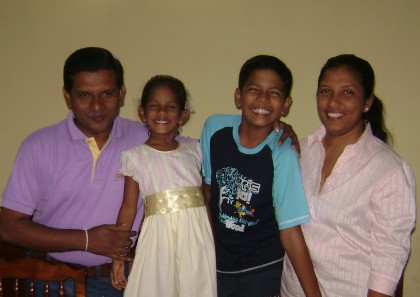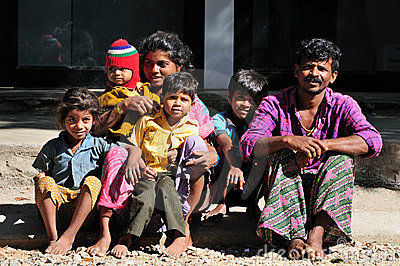Procreation and Human Dignity in the Philippines, or What About the Hard Cases?
Devra Torres | May 3, 2012 | 2 cmts
Today, I'd like to open a can of worms. I hope we'll all still be on speaking terms by the time we're done. But they're important worms.

Last week, I tried to articulate a more personalist take on pronatalism--not, of course, that everyone must have as many children as biologically possible (cf. Catholic Teaching 101), but rather that we shouldn't go around blithely judging that this one or that one should never have been born.
I stand by everything I said about the value of those who happen to be their parents' umpteenth-born, or poor, or don't seem likely to offer the world a lot of entertainment value or marketable skills. Happy pictures of my own very jolly eighth child, and the world's seven-billionth, adorned the post.
But then the conversation turned serious. My friend, Teresa, whom I admire and respect, told me the story of someone she had met during her long experience of providing humanitarian assistance all over the world. Here it is:
...in the remote village of Katipunan in the Philippines, a Subanen woman asked me if it was true that there was a pill that women could take to prevent pregnancy. I told her that there was. She said that the priest...had told her it was wrong to take it. She asked me what I thought. I responded, "You're a mother, what do you think?"
She then told me how she is the mother of nine children. Her husband is a sharecropper on a small plot of land. She has a hard time feeding all of her kids. The oldest ones were in school, but after the sixth baby she had to take them out because there was no more money for school clothes. She then said this:
"I love all my children. But there is no more love in my family with nine children than there was with three, four or five. More kids is not more love. Fewer kids is not less love."
...I then asked her about natural family planning. She laughed at me.
"When your husband has had a drink, what are you going to do?" (She had received the parish training.) I asked her about respect--she laughed at me again. All the women listening to the conversation were laughing at me.
...Our conversation then continued to discuss the pill in more detail....I am an American woman, privileged with the opportunity to choose how big or small my family is AND the resources locally to support my family....I thought I'd share this because I think it provides a different, unprivileged point of view...
Teresa always makes me think. We disagree about whether artificial birth control would create more problems than it would solve for this woman. Still, the subject is well worth addressing. I'm no expert, but I'd like to give it a shot.
In many, many cases, Catholic teaching about responsible parenthood, together with competent instruction in natural family planning, can help dramatically. NFP is as effective as the Pill, has no side effects, and is hands-down the "greenest" possible method, avoiding harm to the environment and the human body alike.
Still, many advocates of artificial birth control are acting out of concern for the poor. My friend doesn't naively see the Pill as a panacea, just the most feasible alternative in an impossible situation. And it's true: just as we don't judge a baby's worth by the quantity of siblings already born or by its parents' income, we should never presume that the quality of a woman's mother-love is directly proportionate to the quantity of her offspring.


We comfortable Westerners should be sparing, too, with casual remarks about children being a blessing and a support in old age. They are. But we need a lively sense of what people like Teresa's friend, who loves her children, are up against. We need to shake the underlying assumption that day-to-day challenges in the developing world are pretty much like our own.


By the same token, those who favor contraception need to realize that its opponents are not really driven by the wish to disempower women and perpetuate misogyny: rather, we believe that intact families and effective, chemical-free methods of spacing or postponing pregnancy benefit women inestimably.
In this particular case, though, NFP is not an immediate option. Just what is this mother supposed to do?
I don't pretend to see a simple solution. But I don't think the Pill offers one, either. Here's why:
ROOT CAUSES:
First, it's a band-aid approach that neglects the root cause entirely and perpetuates the problem. If the culture is such that the husband disregards his family's need for food and education, then a solution consonant with human dignity has to address that. So should we send in some well-intentioned foreigners to harangue or incentivize everybody to abandon their ancestral ways? No--but there are other approaches. Here's what one woman (OK, my mother, Marilyn Prever) had to say:
[Mother Teresa] was very successful in getting poor families to use NFP in India, because when she talked about love and self-discipline, she and her nuns were a living example. Also, they understood the Hindu culture and could work from this inside understanding, from the...long tradition of respect for brahmachari (chastity, although not exactly in the Christian sense).
When Indira Gandhi's population program was using forced sterilization and contraception, Mother Teresa asked for and got an exemption for the poorest of the poor who were being served by the Missionaries of Charity. Her nuns worked with beggars and lepers and illiterate people, and they were able to convince the people--yes, even the husbands!--to make this effort because they trusted her word. She was not somebody coming in from outside. Their record in keeping their birth-rate relatively low and the improvement in women's health showed that poor people could learn NFP and apply it to their lives in a way that lifted up the whole culture.
I think our problem is not so much finding answers to the inevitable hard cases, but living our lives in a way that shows love and care for the poor.
So addressing root causes need not mean abruptly and disrespectfully barging in. In fact, that's often exactly what we're doing when we introduce contraception and abortion to peoples who find them alien to their faith and their understanding of family.
This is truly a "hard case." Let's take it seriously. But hard cases make bad law. Let's not assume that all third-world cultures are incapable of adopting NFP. They may be resistant because of everything from traditional patriarchy to outright misogyny to decades of population-control propoganda claiming that artificial contraception is their only hope. And they could undoubtedly benefit from a more in-depth explanation than "The priest says it's wrong."

MEDICAL CONCERNS
The Pill can pose serious health risks even to middle-class Americans with cutting-edge health care. The dangers under conditions of extreme poverty are magnified enormously: undiagnosed conditions, lack of medical infrastructure, malnutrition, the practice of taking prescriptions every other day to make supplies last... One doctor I spoke with knew a Central American woman who successfully avoided pregnancy only to die of a Pill-induced blood clot.
PROFIT MOTIVE AND MISPLACED PRIORITIES
The Pill comes with an industry attached. Many see its introduction as an act of distinterested benevolence, and many volunteers are indeed intending just that: they want these women to have the same knowledge and options that they themselves take for granted. But there are going to be powerful commercial interests behind a product that has every woman of childbearing age on the planet for its potential market.

A profit motive of that scope is very, very apt to lead to false advertising and the opposite of informed consent.
And speaking of money, the more you devote to birth control, the less you have left for mosquito nets, antibiotics and water purification. It may seem simplistic, but stories abound of pharmacies in need of aspirin and penecillin but overflowing with contraceptives from "benefactors" abroad. This sends an unmistakeably insulting message. Let's hold humanitarian organizations accountable for this sort of thing, and support the ones that don't perpetrate it.
So there's my very incomplete ananlysis of this can of worms. I didn't even get to concerns about coercion, ideology or the abortion connection. But I've sketched some directions a possible solution could take.
What do you think?


Comments (2)
Katie van Schaijik
May 5, 2012 10:19am
Thank you for another thoughtful and thought-provoking post, Devra. I'm especially glad you pointed out that a genuine solution to the hard case your friend raised would have to address the husband's apparent neglect of the good for his family. A pill can't do that, while NFP does. (I wonder whether the parish training she received involved the husband?)
Another point: though I get what she means, I don't think it's quite right for your friend to suggest that fertility management is an American privilege. Fertility cycles are part of the female design, and hence, while not every woman can afford birth control, every woman has a natural, God-given ability to manage her family size--one that doesn't render her dependent on Western pharmaceudical companies.
Occasional Contributor, Anna Halpine, who founded the World Youth Alliance, has been working to develop a program for women's health care that promotes and teaches Natural Family Planning in poor countries. She wrote a post about it a few weeks back.
Devra Torres
May 6, 2012 6:09pm
Thank you, Katie. I spoke with a LOT of people when I was getting that post ready, and many of them brought up a good point: maybe if the priest, or another man, were to speak to the men about NFP, that might be helpful. Not to suggest that you can change a culture instantly just by "dialoguing," but it could be worth trying. And wiith the women, too: I hope it wasn't just a matter of "the priest says it's wrong" plus technical instruction.
I'm not sure if Teresa was suggesting that fertility management is an American privilege, but I think there are many people who have been persuaded to think of it as a human right, just one of the many things that comfortable Westerners can take for granted, like running water or a well-stocked supermarket, and they see it as a no-brainer that women in the developing world should have access to it, too. They're not interested in exploiting women or deceiving them, but the people at the top, of course, have a long history of misinformation and pressure and outright lies.